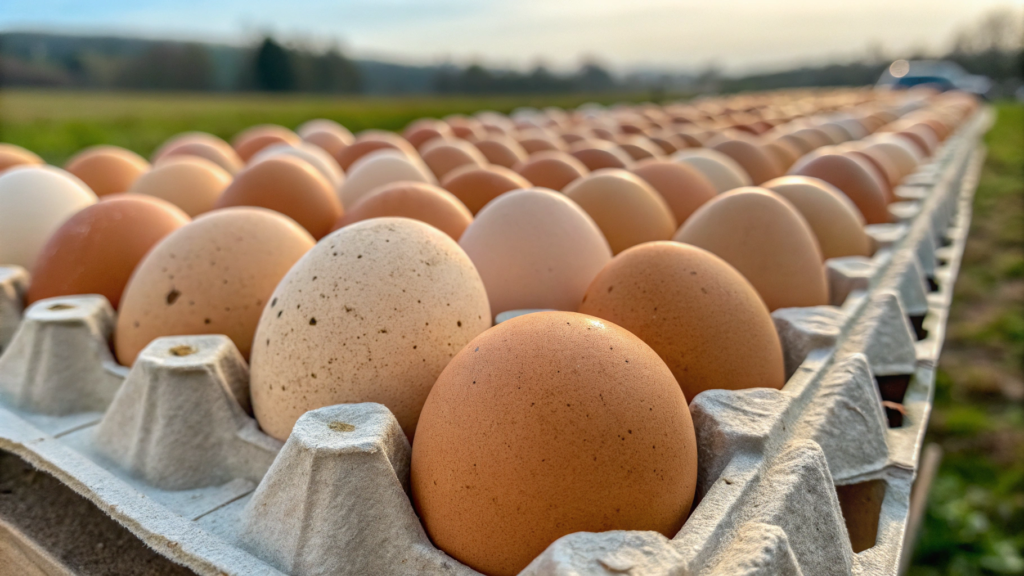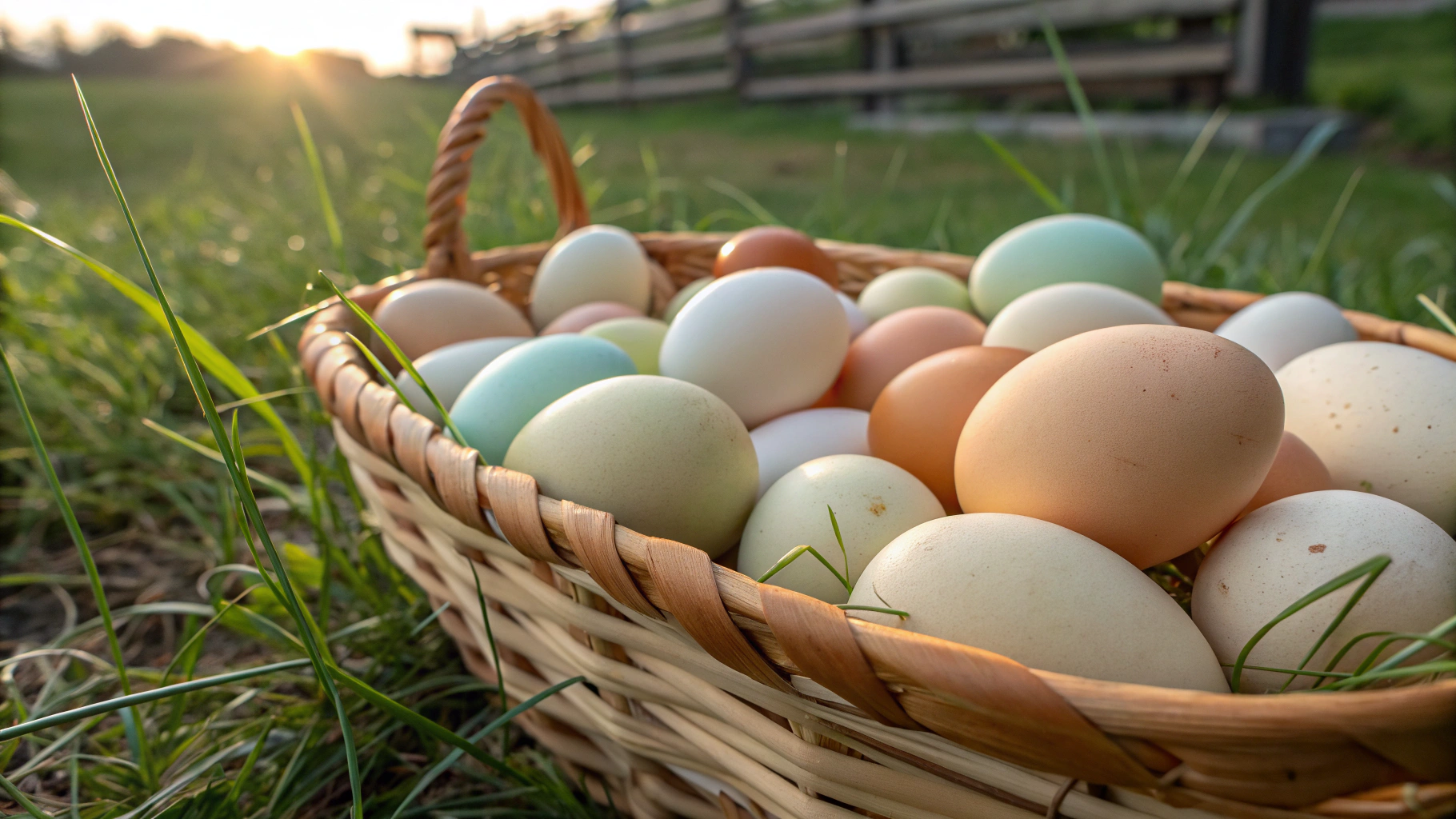
When it comes to cooking, there’s a lot of talk about the quality of ingredients, and one that stands out is pasture raised eggs. These eggs are not just an upgrade in flavor but also packed with nutrients that make every bite worth it. If you’ve ever tried them, you know what a difference fresh, free-range eggs can make in your dishes. Whether you’re scrambling, frying, or baking, pasture raised eggs take your meals to a whole new level. It’s like having a secret ingredient that makes everything taste better!
But the best part? They’re super easy to incorporate into your diet and bring a healthy punch to your plate. You’re going to love the versatility of these eggs! From delicious breakfasts to rich desserts, they’re perfect for any time of the day. So, why not give them a try in your next recipe? Stick around to discover more about how these eggs can transform your cooking and bring extra goodness to your meals!
What Makes Pasture Raised Eggs Different from Conventional Eggs?
The Benefits of Free-Range Farming Practices
When it comes to eggs, pasture raised eggs stand out for many reasons! Unlike conventional eggs, which often come from hens raised in cramped cages, pasture raised eggs are laid by hens that roam freely on open pastures. This freedom lets the hens eat a natural diet, including grass and insects, which makes the eggs richer in nutrients. You’ll find that the yolks are darker, and the flavor is much more vibrant. Plus, the hens are happier! This healthier and ethical farming method creates eggs that are truly different, and when you taste them, you’ll know it. You’re getting more than just a breakfast item; you’re supporting a farming system that’s better for both the animals and the planet.
Nutritional Differences: Why Quality Matters
Pasture raised eggs are not only delicious, but they’re also packed with more nutrients compared to conventionally farmed eggs. Here’s a quick breakdown:
| Nutrient | Pasture Raised Eggs | Conventional Eggs |
|---|---|---|
| Omega-3 Fatty Acids | 2-3 times more | Lower |
| Vitamin D | Higher | Lower |
| Vitamin E | Higher | Lower |
| Beta Carotene | Higher | Lower |
As you can see, choosing pasture raised eggs means more vitamins and essential nutrients, which are great for your overall health.

How to Cook with Pasture Raised Eggs for Maximum Flavor
Enhancing Breakfast Dishes with Fresh Eggs
Cooking with pasture raised eggs brings a whole new level of flavor to your breakfast. Whether you’re making scrambled eggs, an omelette, or sunny-side-up eggs, these eggs have a rich, natural taste that will make every bite irresistible. Their deep golden yolks look as good as they taste, and they cook to perfection without needing much seasoning. For a simple but mouthwatering dish, just crack a couple of these eggs into a hot pan and let them shine. If you’re feeling adventurous, add fresh herbs or a sprinkle of cheese to elevate the flavor even more. Trust me, you’re going to love this!
Creative Uses for Pasture Raised Eggs Beyond Breakfast
Pasture raised eggs can be used in so many dishes beyond breakfast. Here are some fun ideas:
- Baking: Use these eggs in your favorite baked goods for fluffier cakes and richer cookies.
- Salads: Hard-boiled pasture raised eggs make an excellent addition to fresh salads.
- Soups & Stews: Drop a soft-boiled egg into a warm bowl of soup for extra flavor and protein.
- Egg-based Dishes: Make savory quiches, frittatas, or egg salads that pack a punch of nutrition and taste.
Add some of these to your meal rotation, and your taste buds will thank you!
Why You Should Choose Pasture Raised Eggs for Your Health
The Role of Omega-3 Fatty Acids in Pasture Raised Eggs
Pasture raised eggs are a powerhouse of nutrients, and one of the key benefits is their high omega-3 content. Omega-3s are essential fatty acids that our bodies can’t produce on their own, so we need to get them from food. Pasture raised eggs provide 2-3 times more omega-3s than conventional eggs, which are great for heart health and reducing inflammation. Plus, omega-3s are linked to better brain function, so eating pasture raised eggs can help keep your mind sharp.
| Omega-3 Content | Pasture Raised Eggs | Conventional Eggs |
|---|---|---|
| Omega-3 (mg/egg) | 150-250 | 50-100 |
With pasture raised eggs, you’re getting more of this healthy fat in every bite, making them a great choice for your heart and brain!
Supporting Sustainable and Ethical Farming Practices
Another big reason to choose pasture raised eggs is that they support sustainable and ethical farming practices. By choosing these eggs, you’re helping support farms that let hens live in natural environments with plenty of space to roam and forage. This helps reduce the carbon footprint of egg production, since the hens are eating a more natural diet and not being fed synthetic feed.
- Sustainability: Pasture raised farming practices are often more sustainable, with less environmental damage.
- Animal Welfare: Hens are able to live in a natural setting, reducing stress and improving their health.
- Support Local Farmers: By purchasing pasture raised eggs, you’re supporting local, family-run farms.
Choosing these eggs means you’re not just making a healthy choice for you, but for the planet too!

Incorporating Pasture Raised Eggs into a Balanced Diet
Perfect Pairings: How to Combine with Other Healthy Foods
Pasture raised eggs are an excellent addition to a balanced diet, thanks to their rich nutrient profile. Pair them with whole grains, leafy greens, and lean proteins for a meal that keeps you energized throughout the day. For example, try adding scrambled eggs to a whole grain toast with avocado for a filling breakfast that’s packed with fiber and healthy fats. You can also pair eggs with fresh veggies in a frittata or mix them into quinoa or brown rice bowls for an easy, wholesome meal. The possibilities are endless!
| Food Pairing | Health Benefits |
|---|---|
| Leafy Greens | Rich in vitamins & fiber |
| Whole Grains | High in fiber & nutrients |
| Avocado | Packed with healthy fats |
These combos make it easy to stay full, nourished, and satisfied!
Portion Control and Dietary Considerations for Optimal Health
While pasture raised eggs are a nutritious addition to your diet, it’s important to keep portion control in mind to maintain a balanced eating plan. Here are some quick tips:
- Limit to 2-3 eggs per meal for most people, depending on dietary needs.
- Pair with vegetables to boost the fiber content.
- Opt for healthy fats like avocado or olive oil when cooking.
By pairing your eggs wisely and balancing them with other food groups, you’ll be able to enjoy them while staying healthy and feeling your best.
Now that you know how awesome pasture raised eggs are, let’s get cooking! Ready to whip up something delicious and packed with nutrients? Grab those eggs and let’s dive into a veggie-loaded frittata that’ll make your taste buds do a happy dance! 🍳🌱
Ingredients
First, let’s dive into the ingredients that make this Vegetable-Packed Frittata with Pasture Raised Eggs such a delicious and healthy dish.
- 3 cups shredded sweet potato – Sweet potato adds a naturally sweet flavor and soft texture. It’s packed with vitamins and makes the frittata extra hearty. Plus, it’s a fun twist on the usual potato base!
- 1 tablespoon olive oil – Olive oil gives the veggies a beautiful golden color and rich taste. It also helps in cooking everything evenly, making the frittata melt in your mouth.
- 1/2 teaspoon sea salt – A pinch of sea salt enhances the natural flavors of the sweet potato, zucchini, and tomatoes, bringing all the ingredients together for a savory bite.
- 1/4 teaspoon ground black pepper – A dash of black pepper adds just the right kick, balancing the sweetness of the sweet potato and the freshness of the veggies.
- 1 cup shredded zucchini – Zucchini brings moisture to the frittata without being overwhelming. It’s light, fresh, and a perfect way to sneak in some extra veggies!
- 1/4 cup scallions, sliced (green and white parts) – Scallions add a mild onion flavor that complements the veggies. They give the frittata a nice burst of color and taste without overpowering the dish.
- 1/2 cup diced tomato – Tomatoes brighten the frittata with their juicy, tangy flavor, while also adding some beautiful red flecks to the dish.
- 10 pasture raised eggs – Here’s where the magic happens! Pasture raised eggs give a rich, creamy texture and a beautiful, vibrant yolk that makes this frittata stand out. They’re the star of the show!
- 2 tablespoons almond milk – Almond milk adds a bit of creaminess without being too heavy. It helps the eggs set perfectly while keeping the dish dairy-free if that’s your thing.
- 1/2 teaspoon sea salt – Another pinch of salt, this time for the egg mixture. It ensures every bite of the frittata is perfectly seasoned.
- 1/4 teaspoon black pepper – A little more black pepper to ensure your eggs have that slight savory bite.
- 1/4 teaspoon garlic granules – Garlic granules bring an aromatic warmth that complements the veggies, making everything taste so savory and irresistible.
- 2 teaspoons fresh oregano or thyme (or 1 teaspoon dried) – Fresh herbs are the secret to a fragrant, flavorful frittata. Oregano or thyme works wonders in this dish, adding that herby kick.
- 1 ounce goat cheese (optional) – Goat cheese is optional, but it adds a creamy, tangy twist to your frittata. If you’re going dairy-free, simply skip this, and it’ll still be amazing!
Step-by-Step Instructions
Ready to make this vegetable-packed masterpiece? Follow these easy steps to create your Vegetable-Packed Frittata with Pasture Raised Eggs.
- Cook the sweet potato – Heat olive oil in a large skillet over medium heat. Add the shredded sweet potato, sprinkle with sea salt and black pepper, and sauté for 5-7 minutes. Stir occasionally, letting the sweet potato soften and get golden brown. This step adds depth to your frittata’s flavor!
- Add the veggies – Next, toss in the shredded zucchini, scallions, and diced tomato. Stir everything together and cook for another 4-5 minutes. This step softens the veggies and lets them release their delicious juices, making them perfectly tender.
- Prepare the egg mixture – In a separate bowl, whisk the eggs, almond milk, sea salt, black pepper, garlic granules, and fresh herbs. If you’re using goat cheese, crumble it in now. This mixture will bring all the ingredients together into a rich, savory base!
- Combine veggies and eggs – Pour the egg mixture evenly over the cooked veggies in the skillet. Reduce the heat to low, and let the eggs cook for 8-10 minutes. Cover with a lid to help cook the top. This will make your frittata fluffy and fully set.
- Optional oven finish – For a golden top, transfer the skillet to a preheated oven (375°F or 190°C) and bake for 5-7 minutes. This gives your frittata a beautiful, slightly crispy finish.
Serving
Once your frittata is ready, it’s time to serve!
- This recipe serves 4-6 people, making it perfect for breakfast, brunch, or even dinner.
- Serve it on its own, or pair it with a fresh side salad or some crispy toast for a complete meal.
- For a fun twist, try adding avocado slices on top for extra creaminess, or serve with a refreshing chilled drink like iced tea or sparkling water.
Tips and Hacks
Here are some tips to take your Vegetable-Packed Frittata with Pasture Raised Eggs to the next level!
- Tip 1 – If you want to add even more veggies, try adding spinach or bell peppers! They’ll blend beautifully with the sweet potatoes and zucchini.
- Tip 2 – For extra flavor, sauté the veggies in a bit of garlic and herbs before adding the eggs. It’ll bring out even more savory depth.
- Tip 3 – Make this frittata your own by switching out the goat cheese with feta, or try it without any cheese for a lighter option.
- Tip 4 – Store any leftovers in an airtight container in the fridge for up to 3 days. This frittata also reheats wonderfully in the microwave!
Nutrition Facts
Serving size: 1 slice (approx. 1/6 of frittata)
Calories: 180
Fat: 12g
Carbs: 14g
Protein: 8g
Sodium: 340mg
Fiber: 4g
Please note: These values are estimates based on the ingredients used and may vary depending on portion sizes and ingredient brands.
Prep Time
Prep time: 15 minutes
Cook time: 20 minutes
Total time: 35 minutes
Please note: Prep time may vary based on how quickly you shred the sweet potato and zucchini.
Based on the provided sitemap, here are four potential internal links you could use for the article section « What to Serve with Vegetable-Packed Frittata with Pasture Raised Eggs. »
H2: What to Serve with Vegetable-Packed Frittata with Pasture Raised Eggs
- Quick and Easy Side Dishes for Breakfast: Perfect accompaniments to elevate your meal.
- Healthy Salads to Pair with Eggs: Light and refreshing sides for a balanced meal.
- Low-Carb Vegetables to Serve with Frittata: Delicious, nutrient-packed options for health-conscious eaters.
- Wholesome Grains to Complement Your Frittata: Simple and wholesome grains to complete your dish.
Let me know if you need any other adjustments or further ideas!
Frequently Asked Questions (FAQs)
Are pasture raised eggs really better?
Absolutely! Pasture raised eggs come from hens that roam freely outdoors. This means they eat a natural diet, making their eggs richer in nutrients. You’ll notice the yolks are deeper in color and taste better. Plus, these hens live happier lives. If you want fresh, flavorful eggs with better nutrition, pasture raised eggs are a fantastic choice. Give them a try!
What is the difference between free range and pasture raised eggs?
Free range eggs sound great, but pasture raised eggs take it up a notch! Free range hens get some outdoor access, but pasture raised hens enjoy wide-open spaces. They forage, peck, and roam freely. This leads to healthier, tastier eggs. If you want the best for the hens and your breakfast, pasture raised eggs are the way to go. They taste amazing!
Which eggs are truly pasture-raised?
Not all eggs labeled « pasture raised » are the same. Look for certifications like Certified Humane or Animal Welfare Approved. These ensure the hens actually get outdoor space. Also, check for farms that mention at least 108 square feet per hen. When you choose truly pasture raised eggs, you’re getting top-quality, nutrient-rich eggs from happy hens. Your taste buds will thank you!
What are pasture raised eggs called in Australia?
In Australia, pasture raised eggs are often called « pastured eggs. » These come from hens that freely roam on open pastures. Look for labels like « Certified Pasture Raised » to ensure they meet high standards. Australian farms that follow strict welfare practices produce some of the best eggs. If you want fresh, nutritious eggs, pastured eggs in Australia are a fantastic choice. They’re worth every bite!
Many players also participate in social media pizza challenges, creating custom recipes and sharing their results. If you’re a fan of unique desserts, consider trying Edward’s Caramel Pecan Pie for a sweet gaming snack.
Looking to make your own pizza creations at home? Try using Trader Joe’s Pizza Dough: Your Ticket to Homemade Perfection for an easy, high-quality base for your homemade pies!

